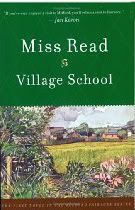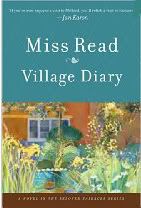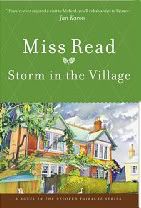Book Review: Chronicles of FairAcre by Miss Read
Sometimes I wonder how I can have read so many books in my lifetime and never have heard of some authors that apparently have quite a following.
One of those authors is Miss Read, the pen name of Dora Jessie Saint, an English novelist, by profession a schoolmistress who began writing for several journals after World War II and eventually produced a series of novels from 1955 to 1996. In 1940 she married her now late husband, Douglas, a former headmaster. The couple have a daughter, Jill.
From Wikipedia:
Her work centred on two fictional English villages, Fairacre and Thrush Green. The principal character in the Fairacre books, “Miss Read”, is an unmarried schoolteacher in a small village school, an acerbic and yet compassionate observer of village life.
According to my count, Miss Read wrote more than 35 novels as well as four non-fiction books, including Miss Read’s Country Cooking.
The book I read was Chronicles of Fairacre, an omnibus of her first three books, shown above. Village School was originally published in 1955, Village Diary in 1957 and Storm in the Village in 1958.
From Wikipedia:
Miss Read’s novels are wry regional social comedies, laced with gentle humour and subtle social commentary. Miss Read is also a keen observer of nature and the changing seasons.
I was particularly interested in in the village/urban relationships. Just as they do today, people in the 1950s wanted to escape the cities to the “simpler” country life.
I did notice that in post war Britain, in the years just after rationing ended, food was indeed very simple. Miss Read’s supper was often tomato sandwiches or cheese & rolls.
I enjoyed reading about some of the games the children played – many of them familiar to me from growing up in the late 1950s in a southwestern Ontario town founded mainly by settlers from Britain.
On a more up to date comparison, I marveled at Miss Read’s description in Village Diary of a typical village couple:
“Mrs. Willet can tackle a hundred jobs, without having been specifically taught any of them. She can salt pork or beef, make jams, jellies, wines, chutneys and pickles; she can bake pies–with all manner of pastries–cakes, tarts, and her own bread…She makes rugs, curtains and her own clothes. She can help a neighbour in childbirth and…compose a corpse’s limbs for decent burial. She is as good a gardener as her husband, can…mend a fuse, and sings in the choir.
She is, in fact, typical of most countrywomen, and with them she shares that self-reliance which is the heritage of those who have had to face tackling daily jobs of varied kinds.”
Miss Read goes on to explain with insight why the “Mrs. Willets lf this world are happy, and deserve to be so”.
And her husband!
“Mr. Willet [who is the school’s caretaker] is equally resourceful. There are very few jobs beyond Mr. Willet’s powers. He replaces hinges, panes of glass, roof tiles, fence palings…I have seen him giving a hand with thatching, cleaning a well, felling a tree, and catching a frightened horse. He can build a shed or garage, laying bricks and smoothing cement…fashion a pair of wooden gates, or erect a bird bath or sundial. He knows how to prune any shrub that grows, how to graft, how to lay a hedge, where to get the best manure, pea-sticks, and beanpoles.”
Although people like the Willets are no longer the majority of those living in the country, I have met several men & women who amaze me with their knowledge and skill in the tasks of country living. And the “average” person here seems to know much more about how to do “things” than those I knew in the city.
In the city, we specialized in what we did – that was our job and we hired other people to take care of things that weren’t our job. In the country, there is neither the money nor the availability of specialists for hire, so one learns to do “it” oneself.
I do find find that, in a survival sense, people in the country display a greater self-reliance–and, according to statistics, happiness.
From Wikipedia:
Her most direct influence is from Jane Austen, although her work also bears similarities to the social comedies of manners written in the 1920s and 1930s, and in particular the work of Barbara Pym. Miss Read’s work has influenced a number of writers in her own turn, including the American writer Jan Karon.
Although there really isn’t much of a plot in any of these books, they become addictive as they meander through village life – and the lives of the villagers. As Miss Read explains:
“…just what it means to be a villager–someone whose welfare is of interest (sometimes of unwelcome interest) to one’s neighbours–but always to matter. …to be part of a small, living community,
‘members one of another,’ so closely linked by ties of kinship, (and) work…that the supposed unhappiness of one elderly woman affected all.”
Technorati Tags: Miss Read, Dora Jessie Saint, Village School, Village Diary, Storm in the Village, Miss Read omnibus, Chronicles of Fairacre, 1950s England, English countryside, self-reliance



How interesting! I’ve never heard of Miss Read, either, but I’m a huge Austen fan — and I have a few Jan Karon books on my shelves, waiting to be read. The idea of a “simple” country life really appeals to me — especially when books are set back in time. In so many ways, life should be “easier” now than it’s ever been… but it does indeed feel difficult. Thanks for the introduction — I’ll look for that omnibus, too! 🙂
Beautifully written cuz. From your “city dwelling” cousin in Orlando Florida
I haven’t read the Fair Acre books but have started in on the charming Thrush Green series. They are perfect when I need a gentle, quiet read.
I’m so glad to meet another fan of Miss Read! I found her books when I was a newlywed, recently transplanted to southern California. They made me homesick (in a good way) for my former rural home in Alabama. Over the years, I’ve collected almost all of her books (still don’t have the cookbook, although I have borrowed it from the library, nor do I have The White Robin, although I have borrowed it and read it several times, also).
Back in the summer I began re-reading all of the Fairacre books in chronological order – something I’ve never done in all my years of reading and re-reading her books. It’s been fun, and I’m still in the midst of the series. After that, I plan to re-read – in order – all of the Thrush Green books.
And if you have not yet read Barbara Pym’s books, you must! She is another author that I’ve read and re-read, and while her books are not as gentle and soothing as Miss Read’s (Pym could be acidic, but in a funny way, with her characters and situations), they certainly deserve shelf-space beside Miss Read’s series.
Country living was quite simple wasn’t it? Nothing at all like what I’m personally used it. It’s amazing how different it is. I mean I can’t imagine what it would be like to live without my internet and cell phone or any of the “luxuries” I’ve been used to. Heck our power goes out for a couple hours and it’s the end of the world!
Thank you for sharing.
Not sure if you will see this from so long ago, but I clicked on your ‘cultural differences’ and found this. I love Miss Read – both her Fairacre and Thrush Green series. There still are some of those people in my part of the country, and I’m happy to see a few young people coming up who can also do a lot of things. I think schools need to focus more on the whole person, not just the traditional scholar type. More shop, electricity, etc. We need people who can do things like car repair and plumbing. I read all the time about how there aren’t shoe repair places or sewing alteration people around. We’ve lost a lot.
Nan – thank you for looking through some of my older posts. I hope you enjoyed this review.
I do know some young people with the types of skills that you describe, but most have been raised in the country. There’s just something about life in the city that encourages specialization and a lack of self-sufficiency, and that also seems to disparage trades that may not be highly-paid.
Having said that, I admit it describes me – a fact I deplore. There is a small plain-dressing Mennonite community in this area, and I am sometimes envious of the upbringing those young people have and the skills training they receive.